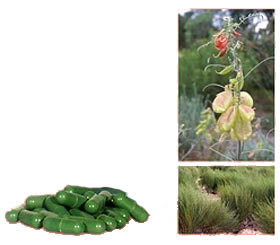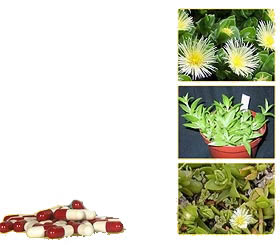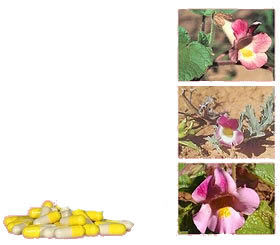Products
| HOODIA
GORDONII
|
Hoodia
Gordonii is a leafless and spiky succulent and is famous
for its effects as an appetite suppressant and mood enhancer.
Hoodia
is the MOST effective ORGANIC appetite suppressant on the market.
SCIENTIFIC
CLASSIFICATION
Botanical Name:
Hoodia GordoniiCommon Names: African Hats, Queen of the Namib, Ghaap,
HoodiaFamily: Asclepiadaceae (s)
Group: Succulents
Origin: Western
Cape, South Africa
Climate: Subtropical
DesertMinimal Winter
Temperature:
12-14 °C, 53,6 - 57,2 - FIdeal Temperature: 28-30 °C, 82,4
- 86 - FLight: bright-sunny
Soil: humus-loam-sandyFlower
Color: Pinkish-brown
ORIGIN:
In South Africa
it is called Ghaap. It grows wild in the wild in semi-desert regions
of South Africa, Botswana, Namibia, Angola, and Zimbabwe…
Exportation of Hoodia from the regions of Boswata, Namibia, Zimbabwe,
have been outlawed by the governments there. For this reason, all
authentic, legally exported Hoodia Gordonii must be grown and manufactured
in South Africa. Although some attempts have been made to cultivate
the Hoodia Gordonii succulents outside of South Africa… the
plants grown did not exhibit the same appetite suppressant qualities.
All attempts thus far have proved unsuccessful. When manufactured
the entire plant is used, including the long spiky stems which can
grow up to 7ft tall, the pinkish-brown flowers, as well as the roots.
Due to the high content of water contained within the succulent,
the manufacturing process yields approximately 1 ton of dry powder
per 20 tons of wet Hoodia Gordonii processed. |
Sutherlandia
Frutescens

|
Sutherlandia
Frutescens is regarded as the most profound and multi-purpose
of all medicinal plants in Southern Africa.
Because of its efficacy as a safe
tonic for diverse health conditions it has enjoyed a long history
of use by all cultures in Southern Africa.
Sutherlandia powerfully assists the body to mobilize its own resources
to cope with diverse physical and mental stresses and it should
therefore be more correctly known as an adaptogenic tonic.
The traditional Tswana name of 'Phetola'
alludes to this:
'Phetola' means it changes, meaning that the plant changes the course
of many illnesses into a favorable outcome. (Similar to the European
concept of an alterative).
The North Sotho name of 'Lerumo-lamadi'
means the spear for the blood symbolising that Sutherlandia is a
powerful blood-purifier or all-purpose tonic.
The indigenous, folk and contemporary
uses of Sutherlandia includes its use as a tonic for:
|
Sceletium

|
Sceletium
elevates mood and decreases anxiety, stress and tension. It also
helps with post-traumatic stress disorder, social phobia, irritability
and can boost libido.
Sceletium tortuosum has been used
by hunter-gatherers and shepherds as a mood-enhancing substance
for hundreds of years and is far more effective and rapidly acting
than the well-known St John's Wort.
It lessens anxiety, stress and tension,
raises spirits and enhances the sense of connection. If you take
a very large dose you may even feel euphoric, then taken over by
a sense of drowsiness. It does not cause hallucinations.
Your
mood and mental performance depend on a variety of nutrients that
feed the brain, nervous system and neurotransmitters. These include
vitamins B3, B6, folic acid (folate), B12 and C, zinc, magnesium,
essential fatty acids, and the amino acids, tryptophan and tyrosine.
|
Devil’s
Claw

|
Devil’s
Claw is a plant native to southern Africa found growing in the Kalahari
desert, Namibia, the island of Madagascar and few other locations.
The name Devil’s Claw comes from the herb’s
unusual fruits, which are covered with numerous small claw-like
appendages.
|
|
Hoodia Gordonii
is a leafless, spiky succulent.
It grows naturally in the Northern Cape, a province of South Africa,
where Nature Conservation registers it as a protected species in the
wild.
Hoodia Gordonii is famous
for its effects as an appetite suppressant and mood enhancer.
Recent research has shown
that the Hoodia Gordonii species contains a molecule that is similar
to glucose, only much stronger. Scientists believe that this molecule
in Hoodia fools the body into believing that it has just eaten.
Hoodia is the most effective
natural appetite suppressant on the market. Many people also experience
an upliftment in their mood immediately, followed by a complete
satiation of the appetite. After eating Hoodia one simply doesn't
feel like eating a meal.
|
|



